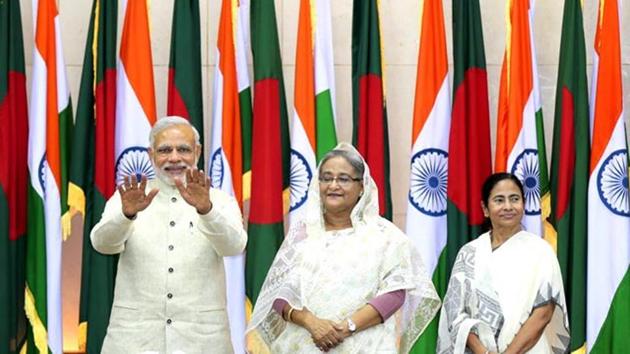Hasina’s visit could take India-Bangladesh ties to the next level if India plays its cards right
Sheikh Hasina knows Bangladesh is highly critical for India’s security and its ‘look east policy’. Dhaka, under her leadership, has proved herself to be New Delhi’s most trusted ally in its fight against terror. Now it is India’s turn to reciprocate with magnanimity
Bangladesh Prime Minister Sheikh Hasina’s four-day visit to India is going to redefine and give a quantum boost not only to India-Bangladesh ties but also lend a new meaning and substance to sub-regional groupings like the BBIN (Bangladesh, Bhutan, India and Nepal) and BIMSTEC (Bay of Bengal Initiative for Multi-Sectoral Technical and Economic Cooperation).

She does not want the two groupings to remain as mere catchwords, but become engines of sub-regional cooperation for economic development. Realising how critically important good ties between the two neighbours are, Hasina wants to give a major push to the concept of sub-regional groupings so that they act as a catalyst of change for other member countries as well.
Politically the visit is very crucial for Hasina as she is in the second half of her second term in office and has already entered election mode for the next parliamentary polls.
Hasina is visiting New Delhi with a list of takeaways that back home will place her politically and electorally at an advantageous position vis-a-vis the Opposition. Her takeaways will also provide major spin-offs for India also. Ensuring water and energy security for Bangladesh, undoubtedly, will top her agenda.
Of course, an accord on Teesta heads the list, but it is still not certain whether a final blueprint for sharing can be worked out to West Bengal chief minister Mamata Banerjee’s satisfaction. Breaking the deadlock on Teesta will severely test Prime Minister Narendra Modi’s statesmanship and diplomatic skills in bringing around a recalcitrant Banerjee to agree to an acceptable settlement. For the last decade she has held the two prime ministers hostage by her inflexible stand on Teesta. And if Hasina is able to get India’s nod on the construction and funding of Bangladesh’s ambitious $4 billion Ganga barrage project, it will be a notable achievement to her two terms in office and four decade-long political career.
Hasina wants India’s cooperation in reinvigorating the health, navigation and management of 54 common rivers which flow between the two countries. For instance, the Ganga barrage will improve the river’s draft upstream and help materialise India’s ambitious national waterways project which will link Varanasi with Kolkata and Narayanganj in Bangladesh and Guwahati in Assam. She wants to connect Bangladesh with India through its waterways.
“Rivers in eastern India and the Northeast and in Bangladesh provide an arterial communication system that was once the mainstay of the economy. Hasina wants to revive that system which is a cheaper and effective communication means. The British understood that waterways provided better connectivity than road and rail. No wonder in pre-Partition India Bengal presidency contributed 30% of crowns revenue in India. Hasina has a vision. Partition divided river system of the region. She now wants to reintegrate the river system for economic revival of the entire region. She wants to rejuvenate the river matrix for which a framework agreement for joint management of river basin is needed. She wants Delhi’s support for her strategy”, said Tariq A Karim, former Bangladesh high commissioner to India and now a distinguished fellow of Vivekananda Foundation.
It is to create jobs for legions of unemployed youth who serve as ready recruits for Islamic militants that she wants energy security for Bangladesh. Energy security holds the key to reaching her political goal and implementing her development strategy — to quicken the pace of economic development. To meet this goal she desperately needs India, Bhutan and Nepal’s help. All these BBIN members are producers of large quantums of hydropower.
If she can get 20,000MW of the 70,000MW of hydropower that the Northeastern states are set to produce within the next decade she need not go in for capital-intensive coal-fired thermal power plants. Already, Bangladesh has immensely benefited by providing transit facilities for transhipment of oversized equipment for Tripura’s Palatana power plant for which it receives 100MW of supply from Tripura. This is soon to be raised to 200MW.
Hasina knows Bangladesh is highly critical for India’s security and its ‘look east policy’. By handing over Indian insurgents and denying them the use of Bangladesh as their launching pad for terror operations and also by providing crucial intelligence inputs on Islamic terror groups she has proved herself to be Delhi’s most trusted ally in its fight against terror. Now it is India’s turn to reciprocate with magnanimity.
It will be short-sighted to expect Hasina sign a defence pact with India on the lines her father had done in 1972. A defence cooperation agreement under which Dhaka can buy armaments, defence equipment is very much on the cards. India will provide training to Bangladesh’s defence personnel and also service two submarines that China has recently sold to Dhaka. This is going to cause heartburn for the Chinese who are against India-Bangladesh joint exercises. But Hasina wants to reduce Bangladesh’s over-dependence on China in defence matters, especially using Bangladesh as a captive market for dumping its old weapons. This change in policy came about after a recent revelation that President Ziaur Rahman had signed a secret defence pact with China.
Manash Ghosh is a senior journalist. The views expressed are personal



